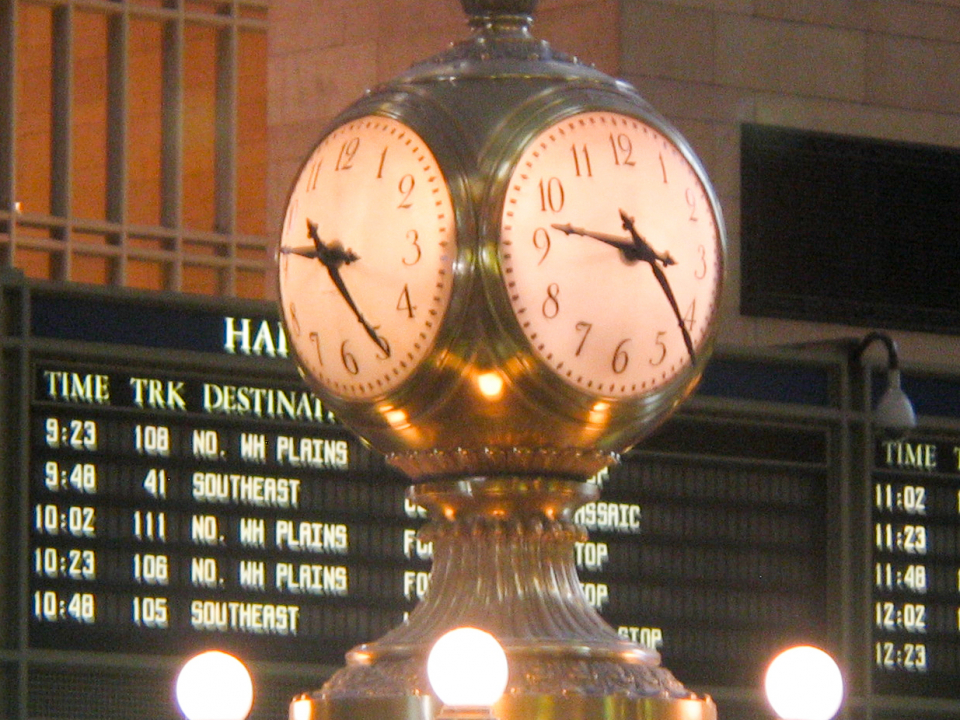A Brief Collapse of Time

We are in lockdown. What day is it? One of the most common comments on social media is the old joke about yesterday, today, tomorrow, everyday. What did we do 2 days ago? 4? 10? Who can accurately recall anymore?
Does this matter? Oh, yes it does. Deeply and intrinsically. This may be the most important thing you read today.
This is going to be a longer discussion than usual. Because this is a challenging concept and concerns the ways in which we view the world, and how that impacts our ability to thrive.
Anyway, what else do you have to do?
Let me cut directly to the chase.
Time cannot be measured
1. Time cannot be measured.
2. The 5.47 train to Liverpool Street Station leaves at 5.47. If you want to be onboard you have to be there.
These two facts are, quite simply, irreconcilable. I suggest that the cognitive effort to do so is one of the greatest causes of stress today.
This is not merely some kind of philosophical statement, or a clever way with words. I means this physically, physiologically, neurologically and biologically.
Time is relative.
This is a fundamental characteristic of the universe.
This is not a psychological construct. This is a fundamental truth of Physics.
I wonder if our continual efforts to deny this reality causes us immense day to day stress, chronic stress. and wears us down.
Furthermore, I wonder if the well-meaning blogs, articles, posts and organisational techniques aimed at helping us ‘manage our time’ are based on the false premise that time can be measured.
This inaccuracy, coming from specialists in the fields of human sciences, might add even more chronic stress in everyday life. Well-meaning folks, attempting to assist us with time management during a pandemic lockdown (or at any time for that matter) are most likely basing their advice on the mistaken premise that the measurement of time is universal and time passes in a regular manner.
There is no such thing as a ‘point in time’.
OK, now I know you have some disagreements here. So let's start with the physics.
Ask any physicist and they will tell you that time is relative. Not in a theoretical or esoteric way but in every day pragmatic ways. The clock at Liverpool St Station does not measure the same passage of time as the aircraft 10,000 metres above the station, which does not measure the same passage time as that on the space station in orbit even higher. All of these clocks measure the passage of time at different rates.
This reality means all clocks are being adjusted constantly everywhere on earth. By ordinary, regular human beings whose jobs are to change time. If they do not do this then our civilisation will be in serious trouble.
Learning
Let’s consider another example. Human learning. A key principle of learning is that once a behaviour or skill is learned the learning remains. OK, I’m generalising, but this is essentially accurate.
Once you learn to ride a bike you can ride it for ever. Once you learn how to read you can read your whole life. Once you learn to drive a car or fly a plane the skill remains.
Let me ask you this: In order to remember how to ride a bike do you need to have a bike in every room of your house or office? Of course not.
We never learn to measure time.
No, I hear you, but that isn’t measuring time. That is reading a clock. Hands pointing to numbers. Numerals on a screen. That isn’t measuring time. That is reading a machine. A machine that does not measure time accurately at all.
If time was constant and universal our magnificent genetic makeup and our amazing ability to learn, adapt and evolve, would have given us the innate ability to measure time according to numbers and dates. But, while we do have some biological processes that are circadian and others that may be lunar and possibly solar these are not precise in the sense that an atomic clock is precise.
Because time is, fundamentally, relative.
We have constructed a world where we are required to consult a piece of paper, or a calendar or a clock in order to give today’s sunrise a name. Monday, Tuesday, May 27 and so on. Without this assistance it is merely sunrise. As there was one yesterday and there will be one tomorrow.
Would you like another example?
Take a look around. How many instruments do you have in your home, office or on your person that have numbers between 1 and 24, with fractions of numbers between 1 and 60?
I bet there are a lot.
If we could really learn to measure time then we would not need these artificial machines. Certainly not in the volume that they exist right now.
Further, what happens when we remove all these machines? Say, when we go on vacation, get away from it all. How long does it take for you to drift away from the numbers? A day? A week? A few hours?
We drift away from these machine-generated numbers because they are not connected to reality. They are not linked to the fundamental structure and process of nature and not with our physiology and certainly not with our cognitive processing.
Often people will a question something like this: “Where were you when the planes flew into the towers?”. That is the wrong question. The best question is, “When were you when the towers came down?” The answer to that question is, for many of us, ‘now’. I think there are only 2 possible answers with any meaning. ‘Now’, or ‘Then’
We either experience events ‘now’ or ‘then’. In terms of cognitive health these are the two key options, and always point towards the correct intervention. Ask a therapist.
We experience time as 'now' or 'then'
A clock does not measure reality.
Over these last few weeks (or is it months?) we have drifted not further away from reality but closer to it. Sure, we are anxious about a very real threat, but many people are enjoying the drift away from the machines. Finding life adrift from regulation by machine a reduction in stress. And yet, we are being as productive as before. Sometimes even more so.
We have been sold a package that has no foundation. Think of any fake machine you can recall you laughed over. A clock is one of those machines.
When we use a machine to tell us something that is not physically real, and then try to manage our lives as a result of what this machine indicates, we become stressed. And the more we try to align our lives to this false information the harder it is to function effectively. And the more we are condemned as failures for not aligning our behaviour with the numbers on a screen the more anxious, depressed and traumatised we become.
Consider this;
I give you a box of nails and a hammer, set you on a boat, and tell you to find a wave and nail down a piece of the ocean. It does not matter how many nails I give you or how big the hammer, this is an impossible task. The waves are constantly on the move.
This is kind of like how Einstein described ‘space-time’. Nailing down time with a multitude of clocks is as futile as nailing down a section of the ocean with a hammer.
And the effort expended in an attempt to do so is exhausting. Chronically and deeply.
Our Western notion of time is artificial. It is manufactured. It is unnatural. It is not biologically normative. It is in almost every way we can assess it, fake.
This is 'constructed' space.
Clock Time is fake time
I suggest that ‘Clock time’ is so far removed from physical reality that our attempts to maintain this fiction are both exhausting and futile. Every atom in our body denies this faked construct.
The truth is that we have never really needed ‘clock time’. Not in the way we seek to define, control and determine it. This most artificial of structures and processes has imprisoned us, constrained us and beaten us down.
Freed of these tools we float, but not aimlessly. We move, but with purpose. We rest, as required. We eat when hungry, we pray when called and ponder when it is right to do so.
Consider what life might look like without the constraints of this ponderous, exhausting cognitive drain. Constantly watching for cues, for signs, for images and symbols that tell us something that seems so important. Something we must remember, even though our mind, our brains, our bodies are not designed to undertake this task at all.
The spiritual mystics tell us to free ourselves and be aware. It seems as if a very important step is to put the clocks aside and leave behind artificial designations of something passing by.
Humans, as with all animals, pay attention to the now. Whether this is the deeply evolved consequences of being both predator and prey millions of years ago, or whether by design, isn’t the point. Our biological, physiological, cognitive and, I submit, spiritual processes are not inherently capable of attending to the passage of ‘minutes’ or the passing of ‘time’. Our attempts to do so are exhausting and, I further submit, lead to an accumulation of stress over the course of a life.
We can only really thrive when we choose, or are forced, to step outside this framework. And when we do we find ourselves socially more aware and open, moving to rhythms and patterns that are found embedded in the function of the earth and, ultimately the universe.
Moving with these rhythms does not mean avoiding work, or falling back into some kind of primitive existence. Rather it might mean different forms of social interaction, relationship and hierarchy.
The more the clock imposes tyranny on our being the more we will become broken. ‘Clock Time’ makes no allowance for variation. It is impenetrable and interminable. ‘Clock Time’ is unmoving, uncaring, rigid and, in every way, non-living.
It is, perhaps, the complete antithesis of life.
All the so-called benefits of ‘Clock Time’ are false. Counting numbers on a dial, or tracing arrows round a dial, do nothing to improve a life.
Maybe this lockdown experience might help us to step outside the box and thrive.
Read next
50 Dead - Resilience Reflection #3 - Social Cohesion
We know that relationships are both protective and growth-promoting. The concept of social support has been discussed in the literature for many years, and we are beginning to understand just...
Read more50 Dead - Resilience Reflection #1 - Anger
I am a professional humanitarian worker. I am expert in resilience and coping. I have years of experience in extremely complex and distressing humanitarian contexts.
Read more

